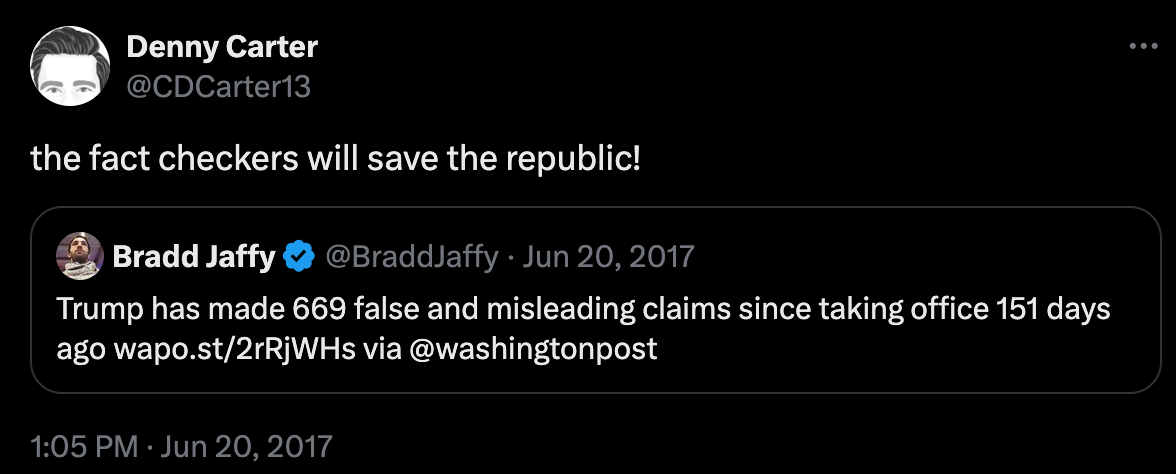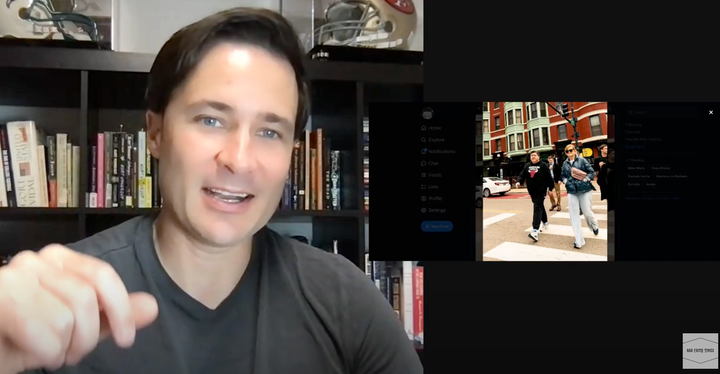We Are Drowning In Propaganda

My dad, during our daily phone conversations based mostly on the day’s sports happenings, never fails to mention Something He Saw Online Today.
This something, he always prefaces, may or may not be real. It’s probably fake. But it seems sorta real, and it was shared on his Facebook feed by a trusted friend or colleague or family member. Ah, he says, it’s probably fake news. Yes, that phrase, so prevalent, such a definitive part of our 21st century lexicon.
But anyway, my dad says after admitting he has no clue about the veracity of the following information, here’s what it says.
Dear dad will then share with me that some politician – usually a normie Democrat – said something outrageous about undocumented migrants or gas prices or one of the many wars raging across the world. Sometimes it’s about a pro athlete – usually a black player – who said something deeply hurtful to Real Americans. Other times is a statistic about U.S. currency or the living standards of Americans who receive welfare benefits.
Subscribe to Bad Faith Times for free or support BFT with $5 a month
I’m never quite sure what to say when my dad shares these maybe-true-but-maybe-totally-false stats and comments and facts and figures. I can see my dad, like so many Americans, is swimming in a veritable ocean of misinformation and propaganda, and he has no idea how to interpret any of it – to suss out what is and is not real. Coming of age in the 70s and 80s, my dad – like so many boomers tethered to their phones and laptops and tablets today – has no mechanism for filtering misinformation and propaganda. He has no chance against such a torrent of shit.
So my dad has conceded that there is no way to say what is and what is not objective reality. In this way, my dad has rejected the very concept of an agreed-upon reality because he knows he’s being manipulated, but couldn’t tell you by whom or how or why. His confusion is total. It defines him. Twenty-five years ago – hell, even fifteen years ago – my dad would have watched the evening news or picked up The Washington Post to figure out what’s going on in the world. Today he is sprayed in the face by a firehose of outright lies and half-truths and carefully-coordinated propagandistic messaging from some of the most villainous people on earth.
Today he has no way of interpreting the world or his place in it. Today he is lost.
Don’t Pretend Facts Matter
I’ve written a lot in the Bad Faith Times – too much, maybe – about fragmentation as the defining feature of internet-driven 21st century culture. In an age where anyone can have their biases confirmed by a multitude of online outlets, nothing is real and nothing is fake. It’s a deeply confusing situation for humans as they process more information in a single day than they would have in a whole lifetime a hundred years ago.
The response to this fracturing on agreed-upon reality has birthed hundreds – more than 400, in fact – fact-checking outfits that promise to counteract the terrible effects of right-wing propaganda and help folks better understand the world in the 21st century. These efforts to check the facts of statements that are intentionally misleading have, as you know, utterly failed in every conceivable way. Fact checking, I would argue, has strengthened the power of propaganda by insufficiently pushing back against right-wing misinformation campaigns and taking a tragically naive both-sides approach to checking so-called facts. In short, the fact checkers have not saved the republic because they either cannot or refuse to comprehend the usage and power of bad faith.

Throughout the Trump administration, a time of eye-watering anxiety and fear for so many Americans, fact checkers did their damndest to soothe us, not by exposing the ocean of disinformation coming from Trump and his allies and media outlets dedicated to serving their master in the Oval Office – the Washington Post identified 3,500 Trump lies from 2016 to 2020 – but to point out that everyone lies. These fact checkers would point to slightly inaccurate wording from Bernie Sanders about tax rates and equate it with Trump telling people to inject bleach into their veins to prevent COVID. Elizabeth Warren being somewhat vague about the benefits of universal pre-K? Buddy, that’s the same as Trump saying a hurricane could wipe parts of landlocked states. A Democratic member of Congress conflating one fascist paramilitary group with another would be treated the same as calls from White House officials – including avowed white supremacist Stephen Miller – to use the levers of power to keep brown and black people from coming to our shores.
There is no difference between good and bad things, the fact checkers wanted you to know. Everyone is equally honest and dishonest. This, somehow, was meant to be a vital public service in a time of disintegrating reality.

The right’s lies and misinformation are all very intentional and in service to the movement’s propaganda campaign meant to chip away at cornerstones of our democratic republic and remove all remaining barriers to permanent rule of right-wing autocrats. This is the reality the fact checkers never acknowledged, and still do not. Their mission was doomed from the start because, as Jonathan D. Teubner and Paul W. Gleason wrote in 2023, one cannot fact check propaganda, for propaganda is designed to be immune to verification. Managerial liberalism, the source from which fact checking springs, can't process this reality.
In an essay for The Hedgehog Review, Gleason and Teubner take a hatchet to the concept of fact checking disinformation. Not only would it be impossible for hundreds – even thousands – of fact-checking outlets to counter millions of propagandistic messages “that slosh around the worldwide digital media ecosystem every hour of the day,” but fact checking “tacitly assumes that propaganda and misinformation are, ultimately, lies.”
Would that it were so simple. On the contrary, at least since World War II, the most effective propagandists have insisted that propaganda should tell the truth. In his Propaganda: The Formation of Men’s Attitudes, French sociologist Jacques Ellul observed that propagandists on either side of World War II were as truthful as they could be. The manual for the American and British expeditionary forces warned that “when the listener catches you in a lie, your power diminishes.… For this reason, never tell a lie which can be discovered.” Joseph Goebbels, Ellul found, “never stopped battling for propaganda to be as accurate as possible.”
You may recognize this in right-wing memes your parents share on Facebook. Such memes – a highly effective way to spread propaganda among low-information voters who have never read a book or article and sneer at the mere concept of intellectual curiosity – will include a true-blue fact or two. An anti-immigrant meme might cite a stat about migration from a government agency or respected journal, showing an increase in migration from this or that region or nation. Combined with a conclusion dripping with fear and paranoia and a photo of a hoard of migrants making their way to the United States border, these facts from outside the right-wing media ecosystem can serve a real purpose for the international right’s anti-immigration project. This gives intellectual and political cover to the person consuming the meme. They might show it to their child or grandkid and say, hey look, your favorite media outlets confirmed something in this scary little meme.
Classic definitions of propaganda, Gleason and Teubner wrote, “place propaganda within the airier realm of rumor, report, picture, suggestion, and symbol. A baldfaced lie would theoretically be open to falsification, which would leave the speaker exposed and discredited. So the skillful propagandist instead works by insinuation, by spinning the significance of events in one way or another, by bringing the reader, listener, or viewer around to a particular point of view. Propaganda creates a general atmosphere in which a particular conclusion seems undeniable, even though it is suggested rather than stated. What matters is not the facts, but their significance.”
Someone ingesting an anti-immigration meme on their Facebook page – a meme that may have originated in the deepest depths of fascist chat rooms – will understand the insinuation of the meme on an unconscious level. They will certainly not link mass migration to climate catastrophe and the horrors wrought by late capitalism, for they have not been told to make this link. They will simply see frightening mobs of people who do not look like them coming to their home country. The facts, they say, are on their side. And in a twisted way, they are.
The concept of fact checking in a deeply online 21st century environment has too many weaknesses to list in one essay. Propaganda is a powerful tool that is not and never has been susceptible to pushing glasses up the bridge of one’s nose and haughty pointing out that facts don’t care about your feelings.
Gleason and Teubner wrote that “since much of what skillful propagandists say will be true on a literal level, the fact-checker will be unable to refute them. Second, no matter how well-intentioned or convincing, the fact-check will also spread the initial claims further. Third, even if the fact-checker manages to catch a few inaccuracies, the larger picture and suggestion will remain in place, and it is this suggestion that moves minds and hearts, and eventually actions.”
The idea that “the facts don’t care about your feelings” is the domain of the far right. It’s what they say when they believe they’ve stumbled on a fact that proves the superiority of the white race or capitalism or whatever other idea that serves as their ideological anchor. This, I think, is supposed to be a big-time lib-owning move, asserting once and for all that conservatives are clear headed, perfectly objective evaluators of what is and is not real, while liberals and leftists are emotional creatures, so weak and pitiful and so caught up their feelings that they can no longer understand reality. The opposite, of course, is true.
A more accurate phrase might be, “Facts don’t affect my feelings.” Nothing in the actual real world can penetrate the right-wing bubble that shapes the feelings of millions of folks who have fallen down the fascist rabbit hole, the red pilled among us – our parents and grandparents, our uncles and aunts, our coworkers and friends and neighbors, the parents on our kid’s softball team, the mailman, the gas station attendant, the grocery clerk, the McDonald’s cashier, the lawn service guy. Everyone.
The Internet And The End of Democracy
I’ve believed for a long time – since college, at least – that widespread access to the internet is incompatible with representative democracy. It’s a view that has drawn more than a few side eyes at parties and get-togethers after I’ve consumed 2.5 hard seltzers and instantly become more apt to share my thoughts on the destructive qualities of the internet, and why it is the worst development in recorded history.
Yes, I can buy trash bags with a few button clicks on my phone and listen to music without fiddling with a record player or CD player. That’s the extent of the internet’s societal contributions.
It’s not that the internet never had potential to be a powerful tool of democracy. The internet, in the hands of a perfect race of beings, could have torn down autocracies the world over. We got an all-too-brief taste of this power during the Occupy Wall Street movement and the Egyptian revolution of 2011. These were real people-powered movements fueled by ubiquitous internet access that accelerated left-wing messaging at a pace never before seen. Pro-freedom movements like these are why Elon Musk bought Twitter to kill it: He thought it essential to snuffing out his political opposition and advancing his politics, which just so happen to align perfectly with Donald Trump's. And maybe in the meantime Elon – an unloved and loveless man in every way – could make some friends online.
Maybe you’re not surprised that the internet has been weaponized by the right as another tool in its war against democracy (conservatism was founded in opposition to self rule and autonomy; don’t let anyone tell you differently). A quarter of the way through the 21st century, internet access means millions of people across the world don’t believe there’s a war being waged in Ukraine; long-dead diseases are coming back thanks to the internet’s anti-vaccination propaganda; not a single Republican believes a violent insurrection occurred in 2021; and my dad thinks Hunter Biden’s laptop contains information that would put his father in prison.
The left, both in the US and abroad, has to stop fighting propaganda with fact checking and a dangerously naive belief that people will choose facts over their feelings. The only way to beat back the harmful, internet-based propaganda strategically deployed by the well-funded and highly-coordinated right is with equally powerful left-wing propaganda. Probably this makes you squirm in your seat. You’re above this. Humans, you believe, are capable of discerning what is and is not real with enough media literacy. I’m here to tell you they are most certainly not.
For every right-wing meme my dad sees, he should be flooded with three memes trumpeting leftist thought. What this looks like in practice I do not know (I’d like to consider that for another Bad Faith Times piece). But fact checking must be replaced with a counterbalanced left-wing propaganda campaign that speaks to regular folks, not those reading Marx in their spare time.
I’m tired of pretending facts matter, that if we keep telling people what is real and what is fake that one day, they’ll wake up and realize the error of their ways. This will never happen. The internet is not going anywhere, and will soon be plugged straight into our brains by our tech billionaire overlords. Holding out hope that the internet will one day become a source of good, of facts and agreed-upon reality, is foolish at best and dangerous at worst.
The only solution to propaganda is more propaganda.
Follow Denny Carter on BlueSky at @cdcarter13.bsky.social and on Threads and X at @CDCarter13.



Comments ()